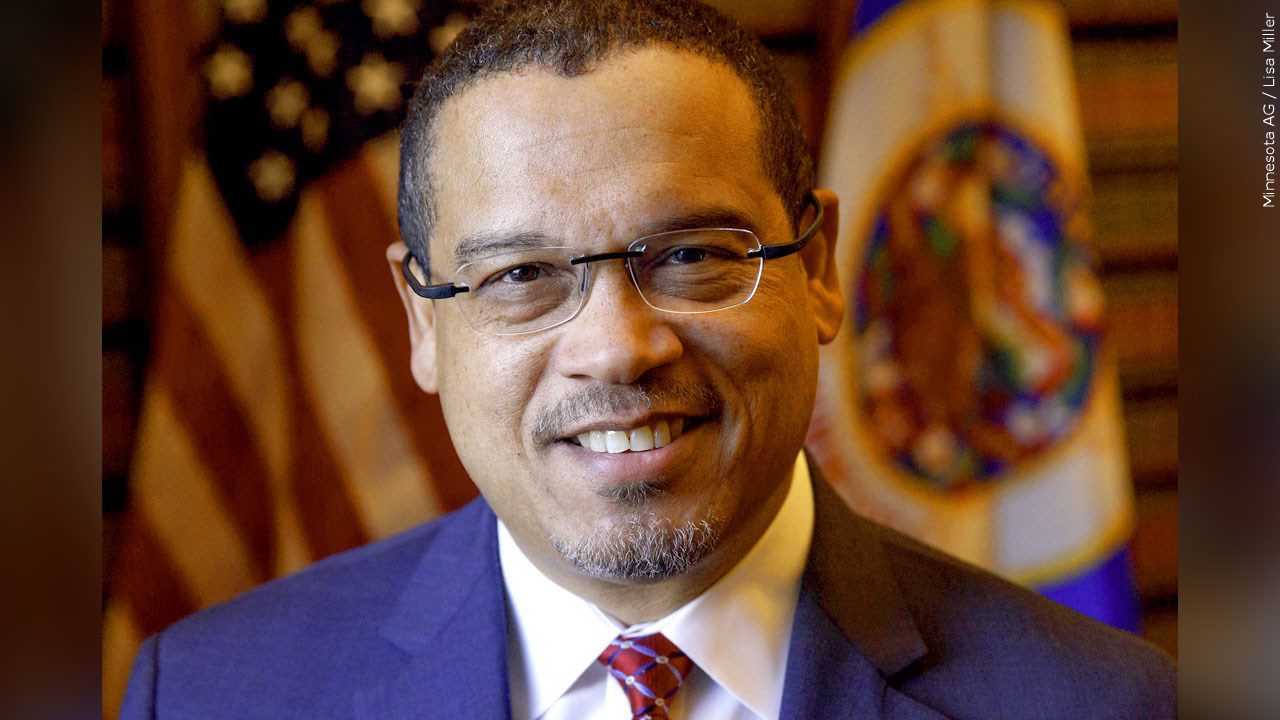Attorney General Ellison clarifies force allowed under SRO law

Photo: Minnesota AG / Lisa Miller
Minnesota Attorney General Keith Ellison issued a second legal clarification to a law prohibiting the use of certain restraints by school resource officers that prompted dozens of agencies to pull officers from schools. Ellison’s report comes following a request from Minnesota Department of Education Commissioner Willie Jett, asking for clarification regarding recent amendments to student discipline laws.
An amendment to the state’s school discipline statute passed as part of a wide-ranging education bill earlier this year, banned school staff or officers contracted to work within school buildings from using any restraint that puts students in a prone position, restricts breathing, hinders communication or places pressure on the neck, head or most of the torso.
In a legal opinion issued on Wednesday, Ellison said the law still allows for “reasonable force” to prevent injury or death, and that includes using physical contact when it appears a student could harm themselves or someone else.
Law enforcement agencies and advocacy groups have argued the law places a separate set of standards on school resource officers and could impede SROs from any physical intervention when students are acting erratically but not violently. Some have also said the law means officers can’t intervene until the moment someone gets hurt.
According to the legal opinion released today, clarifications were made that the amendments also do not limit the types of reasonable force that may be used by public officers to carry out their lawful duties as described in Minnesota Statutes section 609.06, subdivision 1(1). “Reasonable force” is a legal standard that demands that a response be proportional to the threat, based on the totality of the circumstances.
The types of reasonable force available to officers haven’t changed, either, Ellison said. Officers are still able to use lawful force to place students under arrest, carry out legal processes and enforce court orders, among other duties.
“My top concern continues to be that students and school staff be safe in schools and that law-enforcement officers can effectively play their part in keeping them safe,” Ellison said in a statement. “My original legal opinion last month addressed only the question of whether the recent amendments to school-discipline laws allow the use of prone restraints and other techniques in cases of imminent physical harm to self or others. Since then, I have been in conversation with a variety of stakeholders, including law enforcement, who have raised more questions in good faith. I have also seen misunderstandings of the original opinion and the law. I am issuing this supplemental legal opinion, which is consistent with the conclusions of the original opinion, in an effort to address those good-faith concerns and clarify those misunderstandings.”
Republican lawmakers and law enforcement groups have urged Gov. Tim Walz to call a special session to clarify the law, but the governor said this week he wants a consensus on the new language before he does so. He also held out hope that Ellison’s clarification would iron out any remaining confusion.
“And I think it’s a fair point to say, ‘Look, we’re not sure there’s total clarification here,’ and what we’re trying to do is get them clarification,” Walz told reporters on Tuesday. “Clarification from the agencies, clarification from the attorney general, clarification from the insurance companies.”
Despite Walz’s comments and Ellison’s legal opinion, House Minority Leader Lisa Demuth, R-Cold Spring, again called for a special session on Wednesday, accusing Walz of leaving Republicans out of the conversation.
“We need the Governor to realize that explanations aren’t helping,” Demuth said in a statement. “It’s time to include all four caucuses in these discussions, come up with a solution that can pass both chambers, call a special session, and fix this for our schools.”
“Another opinion just demonstrates the need for legislative action to fix this law,” Johnson said. “Students, parents, educators, school staff, and Student Resource Officers all deserve a crystal-clear law that everyone can understand without needing further clarification.”
A spokesperson for the governor issued an update to Walz’s public schedule Wednesday evening to reflect that he was meeting with several law enforcement groups, “legislative leaders” and members of the Attorney General’s Office. No GOP lawmakers were invited to the meeting, according to spokespeople for the House and Senate Republican caucuses.
Hubbard Broadcasting’s 5 EYEWITNESS NEWS has reached out to the Minnesota Chiefs of Police Association and the Minnesota Police and Peace Officers Association for a response to the legal clarification.